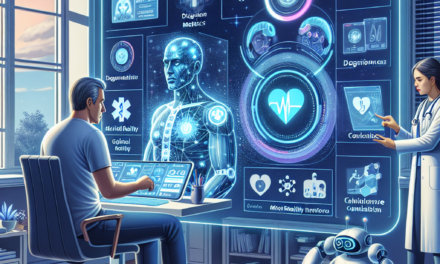Unlocking the Potential of Sensor-Based Digital Health Technologies for Mental Wellness
In recent years, the intersection of technology and mental health has gained significant attention, particularly with the rise of sensor-based digital health technologies. These innovations have the potential to transform how we understand, monitor, and manage mental wellness. This article delves into the various aspects of sensor-based digital health technologies, exploring their applications, benefits, challenges, and future prospects in the realm of mental wellness.
1. Understanding Sensor-Based Digital Health Technologies
Sensor-based digital health technologies encompass a wide range of devices and applications designed to collect, analyze, and interpret data related to an individual’s health. These technologies utilize sensors to monitor physiological and behavioral indicators, providing insights into mental wellness.
1.1 Definition and Types of Sensor-Based Technologies
Sensor-based technologies can be broadly categorized into several types:
- Wearable Devices: These include smartwatches, fitness trackers, and specialized devices that monitor heart rate, sleep patterns, and physical activity.
- Mobile Applications: Apps designed to track mood, anxiety levels, and stress can provide real-time feedback and coping strategies.
- Environmental Sensors: Devices that monitor environmental factors such as noise levels, air quality, and light exposure can influence mental health.
- Telehealth Platforms: These platforms often integrate sensor data to provide remote mental health services and consultations.
Each of these technologies plays a crucial role in gathering data that can inform mental health interventions and support.
1.2 The Science Behind Sensor Data
The effectiveness of sensor-based technologies lies in their ability to collect real-time data that reflects an individual’s mental state. For instance, heart rate variability (HRV) is a key indicator of stress and emotional regulation. Research has shown that lower HRV is associated with anxiety and depression. By continuously monitoring HRV through wearable devices, individuals can gain insights into their stress levels and emotional well-being.
Moreover, sleep quality is another critical factor in mental health. Studies indicate that poor sleep is linked to various mental health disorders. Wearable devices that track sleep patterns can help users identify disturbances and make necessary lifestyle adjustments.
2. Applications of Sensor-Based Technologies in Mental Wellness
Sensor-based digital health technologies have a wide array of applications in promoting mental wellness. These applications range from self-monitoring to professional interventions, providing a comprehensive approach to mental health care.
2.1 Self-Monitoring and Personal Insights
One of the most significant advantages of sensor-based technologies is the ability for individuals to monitor their mental health proactively. Mobile applications that track mood, anxiety levels, and stress can empower users to identify patterns and triggers in their emotional states.
For example, the app Moodfit allows users to log their mood daily and correlate it with various factors such as sleep, exercise, and social interactions. This self-monitoring can lead to greater self-awareness and informed decision-making regarding mental health strategies.
2.2 Remote Therapy and Telehealth
Telehealth platforms have gained traction, especially during the COVID-19 pandemic, as they provide accessible mental health services. By integrating sensor data, therapists can gain a more comprehensive understanding of their clients’ mental states. For instance, a therapist can review a client’s sleep patterns and stress levels collected from wearable devices during a session, allowing for more tailored interventions.
Research indicates that teletherapy can be as effective as in-person therapy for many individuals. The integration of sensor data enhances this effectiveness by providing therapists with real-time insights into their clients’ mental health.
2.3 Crisis Intervention and Monitoring
Sensor-based technologies can also play a crucial role in crisis intervention. For instance, wearable devices equipped with biosensors can detect physiological signs of distress, such as increased heart rate or sweating. In such cases, the device can alert the user or a designated support person, enabling timely intervention.
Case studies have shown that individuals with severe anxiety or panic disorders benefit from such technologies. For example, the use of smartwatches that monitor heart rate and provide breathing exercises during moments of high anxiety has proven effective in reducing panic attacks.
2.4 Community Support and Engagement
Sensor-based technologies can foster community support by connecting individuals with similar mental health challenges. Online platforms and apps can facilitate group discussions, sharing of experiences, and collective coping strategies. For instance, platforms like 7 Cups provide anonymous chat support, allowing users to connect with trained listeners and peers.
By leveraging sensor data, these platforms can also suggest community resources or local support groups based on users’ needs and preferences.
2.5 Research and Data Collection
Sensor-based technologies are invaluable for researchers studying mental health trends and interventions. By collecting large datasets on user behavior, researchers can identify correlations between lifestyle factors and mental health outcomes. For example, studies utilizing data from fitness trackers have revealed insights into the relationship between physical activity levels and mood disorders.
This data-driven approach can lead to the development of more effective mental health interventions and policies, ultimately benefiting society as a whole.
3. Benefits of Sensor-Based Digital Health Technologies
The integration of sensor-based technologies into mental health care offers numerous benefits, enhancing both individual experiences and broader health outcomes.
3.1 Increased Accessibility
One of the most significant advantages of sensor-based technologies is their ability to increase accessibility to mental health resources. Individuals in remote or underserved areas can access mental health support through telehealth platforms and mobile applications, reducing barriers to care.
Statistics show that approximately 1 in 5 adults in the U.S. experience mental illness each year, yet many do not receive treatment due to various barriers. Sensor-based technologies can bridge this gap by providing immediate access to resources and support.
3.2 Enhanced Personalization
Sensor data allows for a more personalized approach to mental health care. By understanding an individual’s unique patterns and triggers, mental health professionals can tailor interventions to meet specific needs. This personalized approach can lead to more effective treatment outcomes.
For instance, if a user consistently reports increased anxiety levels during specific times of the day, therapists can work with them to develop targeted coping strategies for those moments.
3.3 Real-Time Feedback and Intervention
Real-time monitoring of mental health indicators enables timely interventions. For example, if a wearable device detects elevated stress levels, it can prompt the user to engage in relaxation techniques or alert a support person. This immediate feedback can prevent escalation and promote healthier coping mechanisms.
3.4 Empowerment and Self-Management
Sensor-based technologies empower individuals to take charge of their mental health. By providing tools for self-monitoring and self-management, users can develop a greater sense of agency over their well-being. This empowerment can lead to improved mental health outcomes and increased resilience.
Research indicates that individuals who actively engage in self-monitoring are more likely to adhere to treatment plans and make positive lifestyle changes.
3.5 Cost-Effectiveness
Integrating sensor-based technologies into mental health care can lead to cost savings for both individuals and healthcare systems. By providing early interventions and reducing the need for more intensive treatments, these technologies can lower overall healthcare costs.
A study published in the Journal of Medical Internet Research found that digital health interventions could reduce healthcare costs by up to 30% by preventing the escalation of mental health issues.
4. Challenges and Limitations of Sensor-Based Technologies
Despite the numerous benefits, the integration of sensor-based digital health technologies into mental wellness is not without challenges. Understanding these limitations is crucial for effective implementation and utilization.
4.1 Privacy and Data Security Concerns
One of the primary concerns surrounding sensor-based technologies is the privacy and security of personal data. Users may be hesitant to share sensitive information related to their mental health due to fears of data breaches or misuse.
To address these concerns, developers must prioritize robust security measures and transparent data policies. Users should be informed about how their data will be used and have control over their information.
4.2 Technology Literacy and Accessibility
While sensor-based technologies can increase accessibility, they also require a certain level of technological literacy. Individuals who are not comfortable using technology may struggle to engage with these tools effectively.
To mitigate this issue, mental health professionals should provide guidance and support to help users navigate these technologies. Additionally, developers should strive to create user-friendly interfaces that cater to diverse populations.
4.3 Over-Reliance on Technology
There is a risk that individuals may become overly reliant on technology for managing their mental health, potentially neglecting traditional therapeutic approaches. While sensor-based technologies can be valuable tools, they should complement, not replace, professional mental health care.
It is essential for users to maintain a balanced approach, integrating technology with other therapeutic modalities such as counseling or support groups.
4.4 Data Interpretation Challenges
Interpreting sensor data can be complex, and individuals may misinterpret their results. For instance, a temporary spike in heart rate may be perceived as a sign of anxiety, while it could be a normal physiological response to exercise.
To address this challenge, educational resources should be provided to help users understand their data accurately. Mental health professionals can also play a crucial role in guiding individuals in interpreting their sensor data.
4.5 Ethical Considerations
The use of sensor-based technologies raises ethical questions regarding consent, autonomy, and the potential for stigmatization. For example, if an employer implements wearable devices to monitor employees’ stress levels, it may lead to concerns about surveillance and privacy.
Ethical frameworks must be established to ensure that the use of these technologies respects individuals’ rights and promotes their well-being.
5. The Future of Sensor-Based Digital Health Technologies in Mental Wellness
The future of sensor-based digital health technologies in mental wellness is promising, with ongoing advancements and innovations on the horizon. As technology continues to evolve, so too will its applications in mental health care.
5.1 Integration with Artificial Intelligence
Artificial intelligence (AI) has the potential to revolutionize the field of mental health by enhancing the capabilities of sensor-based technologies. AI algorithms can analyze vast amounts of data to identify patterns and predict mental health trends.
For instance, AI-driven applications could provide personalized recommendations for coping strategies based on an individual’s unique data profile. This integration could lead to more effective and tailored mental health interventions.
5.2 Expansion of Telehealth Services
The COVID-19 pandemic has accelerated the adoption of telehealth services, and this trend is likely to continue. As more individuals become comfortable with remote mental health care, the integration of sensor data into telehealth platforms will enhance the quality of care provided.
Future telehealth services may incorporate real-time monitoring of mental health indicators, allowing therapists to make informed decisions during virtual sessions.
5.3 Development of New Sensor Technologies
As technology advances, new sensors and devices will emerge, offering even more precise and comprehensive monitoring of mental health indicators. For example, advancements in neurotechnology may enable the monitoring of brain activity in real-time, providing insights into cognitive and emotional states.
These innovations could lead to breakthroughs in understanding mental health disorders and developing targeted interventions.
5.4 Increased Collaboration Between Stakeholders
The future of sensor-based technologies in mental wellness will require collaboration between various stakeholders, including healthcare providers, technology developers, researchers, and policymakers. By working together, these groups can create a cohesive framework for integrating technology into mental health care.
Collaborative efforts can also address ethical considerations and ensure that the use of sensor-based technologies aligns with best practices in mental health care.
5.5 Focus on Holistic Approaches
The future of mental wellness will likely emphasize holistic approaches that consider the interplay between physical, emotional, and social factors. Sensor-based technologies can play a vital role in this holistic perspective by providing comprehensive data that informs treatment plans.
For example, integrating data on physical activity, sleep, and social interactions can lead to a more nuanced understanding of an individual’s mental health and well-being.
Conclusion
Sensor-based digital health technologies hold immense potential for enhancing mental wellness. By providing real-time data, promoting self-monitoring, and facilitating access to care, these technologies can empower individuals to take charge of their mental health. However, challenges such as privacy concerns, technology literacy, and ethical considerations must be addressed to ensure their effective implementation.
The future of sensor-based technologies in mental wellness is bright, with advancements in AI, telehealth, and new sensor technologies on the horizon. By fostering collaboration among stakeholders and focusing on holistic approaches, we can unlock the full potential of these innovations to improve mental health outcomes for individuals and communities alike.
As we continue to explore the intersection of technology and mental health, it is essential to remain mindful of the ethical implications and prioritize the well-being of individuals. With thoughtful implementation and ongoing research, sensor-based digital health technologies can play a transformative role in promoting mental wellness in our increasingly digital world.





